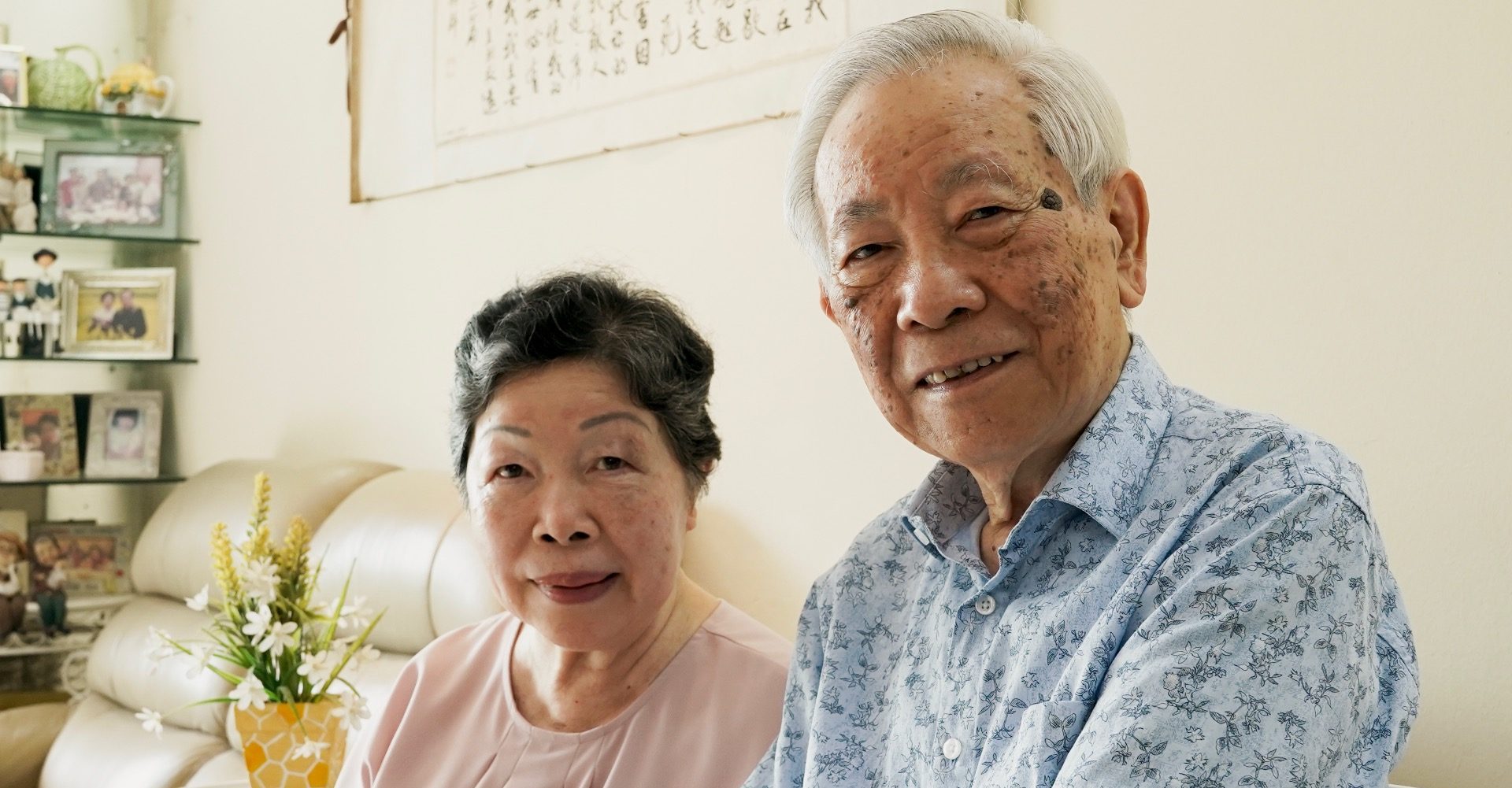Louise: Things Chinese, and A Vision
For seven years, Louise sang China’s national anthem as a young girl in school in Jakarta. Chinese students studying in Indonesia then were allowed to sing the Chinese anthem 义勇军进行曲 “March of the Volunteers” as the then Indonesian President Soekarno was a close ally of China in the 1950s.

From then on, she loved the song, the country it belongs to and all things Chinese. Louise did not think much of the significance of singing this anthem in her life till later. Like many other things in her life and that of her husband Loon Siong, these were far from coincidences; the significance of the lyrics would greatly impact her—in her heart and in the community it was sung. “Rise up” or 起来 was a repeated refrain in the anthem, and indeed they both rose up for God in and for the community that the anthem was sung in.
Louise moved to Singapore from Jakarta when she was 11. Moving from Jakarta to Singapore in 1958, a quick chain of events facilitated Louise’s entry into Chinese education, which would lay the foundation for her foray into missions in East Asia some 40 years later.
As her parents were hardly able to fund her education, Louise negotiated with the Indonesian parents of her Chinese tutees to pay her tuition fees if they did well. Louise’s resourcefulness paid off—the children did well under her tutelage, and she continued to be funded for her studies.
At the tender age of 14, Louise sought God. She was walking along Sophia Road after giving a tuition class. She said to herself: “If there were a God, He would appear to me. I thought I was very bold. Then I heard loud singing. I peeped through a gate—and it was coming from a choir. The choir master invited me in to sit and listen. The hymns appealed greatly to me and gave me much peace. I knew then that this was the path for me.
“I joined the Church of Christ of Malaya, a Hakka church, and two years later, I was baptised. At 18, I was very eager to serve Him. I wanted to go to Bible College and study full-time, but the principal said I was too young. He asked me to serve in the church first. I did not realise at that time that I had to wait almost 30 years before I finally went to Bible College.”
Louise was 47 years old when she had a vision. She saw many people running out of a hole that had opened up in a dark, explosive mountain. She did not know what it was and who they were. It was only later that she realised they were the minority group of people she was sent to serve decades later—the Yi—with their distinctive costumes. She was unsure what the vision meant or signified, but she kept the vision in her mind. And she waited.
By then, Louise’s career as a teacher was at a peak, having been a Chinese language teacher for about 28 years. It was not till then and as she opted for early retirement that God called Louise back to school. It truly was God’s way of preparing her for the work in East Asia. If she had gone to Bible College at 18 years old, she might not have stayed the course.
Loon Siong: Becoming a Christian, and Marrying Louise
Loon Siong was born in 1938 to parents who had migrated from China and settled in Singapore. His father was a semi-literate mechanic who struggled to support the family. The fifth in a family of seven children, Loon Siong had a fairly stable childhood. Although Loon Siong and his siblings filled their days running around the kampong (Malay for village), fishing and swimming, the family did not have much. On the hard times, Loon Siong has this to say:
“I grew up in the kampongs in the early years of my life before I finally settled down in an HDB flat in Queenstown. Life was hard then. We moved from kampong to kampong at least four times. No electricity then—had to use oil lamps or kerosene lamps for lighting or study. My duty was to light up the lamps every evening. Only around the mid-fifties was electricity supplied to individual homes.
“Water was another problem. There was no individual home supply. A communal water stand pipe was installed in the kampong. One had to queue for their turn to collect the water. My assignment was to collect water for the family every morning except the weekends—four buckets in two trips before I set off to school (pm session). The stand pipe was about 200 meters away”.
Little did he know that this hardship would work to his benefit later on in his life as a missionary.
Money was tight, and their father cautioned Loon Siong and his siblings that if they failed, they would need to leave school and take on apprenticeships to be a tailor, cobbler or plumber. Loon Siong managed to obtain his Senior Cambridge credentials, before becoming a medical laboratory officer at a government hospital laboratory, a job he held for over 40-odd years.
Growing up, Loon Siong remembers foreign missionaries playing Christian songs on a portable gramophone at a rally. They invited him to accept God, but he paid no heed. Together with other children, they used to laugh at the travelling expatriate preachers. They sang and taunted them in dialect: “Jesus is coming.”
He continued to dodge God. He declined going to the meetings his Christian classmates in secondary school invited him to. Loon Siong said: “Even when I joined the YMCA because I needed a place to practise my table tennis—a sport I fell in love with—God continued to pursue me through the Christians there. The YMCA Christians, including their secretary-general, Mr Wang, encouraged me to accept God, but I turned a deaf ear.
“I also loved singing, especially in Chinese, which I had studied as a second language in school. After joining the newly-minted People’s Association Choir which was bilingual, I went on to audition for the National Theatre Choir in 1969 and was accepted! It was in this Choir that I met Louise. We courted for just seven months before getting married at the Registry of Marriages. Louise wore a gown that she sewed herself!
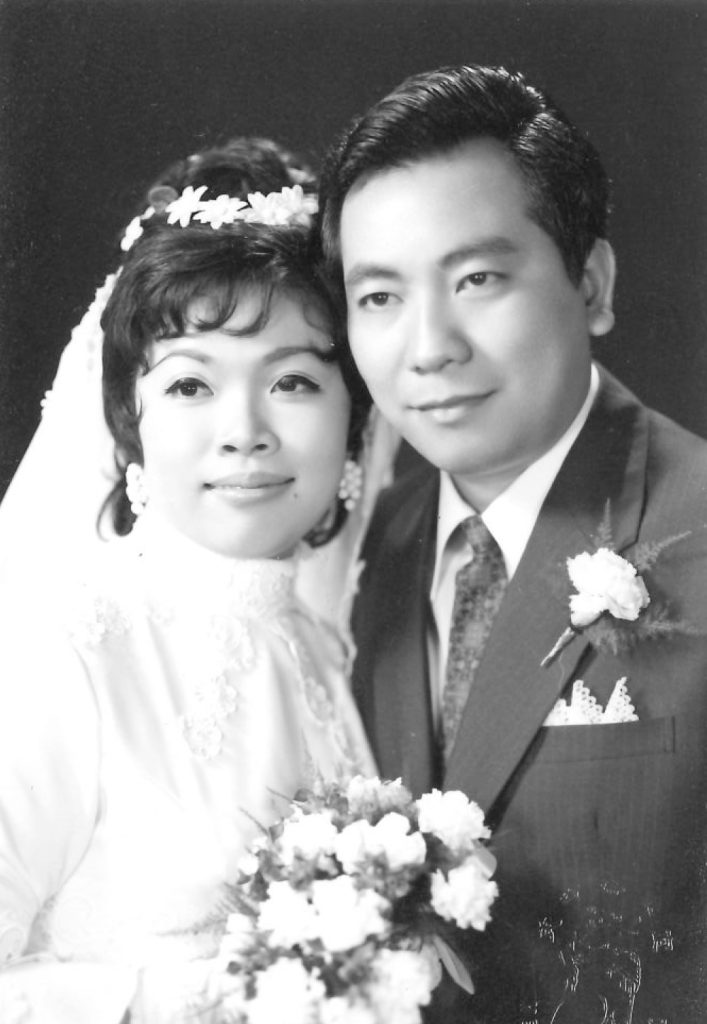
After they got married, Louise brought Loon Siong to the Hakka church that she was still attending at that time—the Church of Christ of Malaya. Loon Siong recalls: “The service was all in Hakka, and I couldn’t understand it at all. I remember that I was so turned off. Subsequently, the Lord led us to Wesley Methodist Church, and this was where I committed my life to God. This was after the boys had arrived so there was stability on the home front, compared to when they were little. Caring for them meant irregular church attendance. Now that we could attend church more regularly, I paid more heed to the hymns sung, and I finally accepted the Lord.
“It was not till I was 42 years old that Louise and I had the opportunity to say our wedding vows for the first time at a marriage enrichment seminar conducted by the Rev Dr Isaac Lim and his wife Shirley.”

Serving and Being Inspired Together
For the Fongs, the series of evangelistic meetings was especially memorable, initiated first by Rev Dr Tony Chi in 1978, and later on continued by Rev Dr Isaac Lim into the 1980s. It was an opportunity for the entire family to serve together at these meetings. Loon Siong and Louise sang in the choir, while sons Raymond and Edmund performed with the Sunbeams children’s choir.

In 1993, the Fongs joined the Mandarin Ministry (MM), taking turns to lead the worship.
Louise adds: “Looking back, this was where we started to prepare for our journey to East Asia. We had no inkling of what God intended us to do next, but we kept ourselves busy. We organised evangelism trips to Tanjong Pinang and Batam, and church camps into Johore Bahru and Malacca. Loon Siong drove members of our small group in the church van to visit the patients at St Luke’s Hospital for the Elderly, as well as the old folks living at the Lim Ah Mooi Old Age Home. Leaving Singapore to serve God was something that we never expected.”
Journey to East Asia – Doors Closing and Opening
Where did the Lord want the Fongs to go to in East Asia, and who did He want them to reach?
Louise explained: “Our journey to East Asia was not a straightforward one. Different groups were involved: agencies, organisations and the missions exploratory team at Wesley. It was our Church’s plan to send us out as a married couple to serve together. It was not easy to find an opportunity that ticked the boxes and matched our skillsets.”
Identifying the right target group was easy by comparison. Target Ministry, a Hong Kong-based consultancy, recommended the largest minority group in East Asia—the Yi people. There were eight million of them in this Unreached People Group. Overseas Missions Fellowship (OMF) were already working with them. Loon Siong joined an OMF exploratory team to determine the different kinds of medical instruments needed in their work to upgrade approved hospitals among the Yi people. With his experience as a medical laboratory assistant, he seemed well-suited for the role.
But this opportunity was dashed when they found out that there was no vacancy for Louise as a school teacher.
Other doors closed in succession too. Campus Crusade required them to be students; an American international school required them to speak American English; and a commercial agency required the Fongs to have a commerce or finance background. Target Ministry proposed setting up a Yi Orphanage, but this door closed as there were sensitivities bringing in foreigners to manage this.
Finally God brought them the opening that Louise and Loon Siong had been waiting for. It was a project by an international non-governmental organisation (NGO) to bless the country. Louise recalls: “We asked if they had a vacancy for us. They told us ‘if you have a heart to serve, you will be given a place.’ This opened the door for us, and soon, I was granted a visa as a staff of this organisation, with Loon Siong as my dependent!
“The Lord was gracious to provide us confirmation to forge ahead before we left Singapore. He addressed my fears in different ways. As a mother, I thought I would ‘lose’ my sons as the vision of this mission dawned upon me. We faced other challenges too in our early days in the field.”
God Confirmed, Not Just Once, But Several Times!
In 1997, older son Raymond had just entered the job market. Their younger son Edmund was about to enlist for National Service. This was a time that both Louise and Loon Siong felt that the family should be together, not apart.
Both sons however reassured them and told them they should just go. Loon Siong also got Raymond to take care of his younger brother, Edmund, as he was then still single.
With the home front settled, and their sons’ blessings to go into the field as full-time missionaries, they received the peace to venture forth. Both Raymond and Edmund continued to uphold their parents in prayer, and in support as well. They also visited their parents in the mission field.
On one of his visits, Raymond observed that traffic was chaotic in the city where his parents were based. His parents were moving around on their bicycles, and what they really needed was a safer mode of transport. Louise had already fallen three times from her bicycle by then! So Raymond sponsored a 面包车 “mian bao che”, a “bread-shaped van” for his parents to use and to get around more safely!
Prior to travelling to East Asia, Louise had to deal with three health issues. In 1996, while embarking to study at Singapore Bible College in preparation to go into ministry, Louise underwent a total hysterectomy after an inflammation in her womb caused constant bleeding. Soon after, Louise’s knees gave trouble. She felt immense pain from her knees, and was told that they would have to be operated upon.
Louise said: “I told the doctor that I would be leaving soon for a very important mission. The operation on my knees would delay our plans. Praise God that the doctor I consulted advised me to pray instead. This godly advice confirmed to us that we could indeed leave with no immediate danger. And, the wonderful thing was, one day while walking along a mountain track in the field, my knees stopped being painful! At that time, I hardly noticed it, as I was concentrating on trudging carefully through the treacherous path. Indeed God heals in His own time, and not according to our own estimate of when it would be convenient to do so!”

It was clear that God cleared the way for both Louise and Loon Siong by freeing them from the need to worry about discomfort, pain and medical treatments while they were out in the field. One day, Louise feared the worst when she detected a few lumps in her breast. Before returning to Singapore, she confided in a group of Christian Yi ladies. She knew that she might not be able to return to their midst if her worst fears were confirmed.
Louis shared: “Confidently and without hesitation, they gathered around to assure me that I would indeed be safe, and that I would return to them. They told me that they were going to pray for me in a special cave in the mountains just outside their village. This was where they went to pray for special occasions and cases. When I returned to Singapore to undergo my mammogram, I was so, so surprised and gladdened that the scan revealed no lumps at all!”
His Plan and Direction Manifested
The couple recall incidents of God fulfilling His plan for them in the field. The story that follows is a clear reminder of how He prepared Louise to take on a major challenge in the field from when she was a young girl in Jakarta.
Loon Siong shares: “In our second year there, we were organising a graduation ceremony for a batch of students who had completed the village doctors training, that was to take place in the school hall of an adjoining school—one for disabled students. Since this school was also organising a graduation ceremony for their own students, we were given a proposal that the event be combined. We consented and so appeared at the hall of the school in question where the combined event was to take place— an event attended by many invited guests who were supporters and sponsors of the school for the disabled, all resplendently dressed and seated on the stage.”
Louise continues: “Close to the starting time of the ceremony, things were abuzz—it appeared that the school official who was responsible for bringing the cassette tape of the National Anthem to be played at the start had forgotten to bring it. There ensued some commotion beneath the surface of things as to how the ceremony would then proceed, seeing that the song that would give the audience the cue to start singing the National Anthem was not going to come on. The emcee who communicated the startling news was standing next to the school principal, who was standing next to the Director of the NGO which I was employed in.
“The latter motioned to me and requested that my students who made up the choir lead in the singing. This I did, bravely and with great gusto, so much so that some of the guests started querying among themselves who the brave lady was who sang the National Anthem so competently in Mandarin.
“It was then that I realised that I have been prepared for such a time as this, way back when I was a mere child. Such is God’s timing and placement of His servants to do His will.”
Encountering God, And Their Faith Deepened
God showed His ways and purposes through the people they met in their 15-year journey among the Yi people.
For Loon Siong, there have been so many instances when God showed him things he needed to know and be mindful of. He shared: “We had given a semi-blind Christian believer a cow to help him with the ploughing of his fields. One day, he went with his friends for a prayer meeting at another village. On returning to his home after the meeting, he found that his cow had been stolen. Instead of being mad and sad over the loss, we were amazed that he stopped to give thanks to the Lord for two blessings. One, that it was only a cow, and his house had not been burned down; and two, that he was not the thief, someone else was.”
Loon Siong was touched by such a simple faith and knew that God was teaching him a lesson, correcting thoughts of indignation and anger. He was reminded that he had journeyed there to bless a community, but instead, he was blessed by them.
In another instance, Loon Siong witnessed a woman in her seventies crying and lifting her hands upwards to the sky after a Sunday School teachers training course. She was uttering “Amo” (or God in the Yi dialect). With the help of their co-workers, they found out that the woman had been praying for fifty years for the Sunday School to be re-opened. When she was just 12 years old in 1949, she was among those expelled from the Sunday School run by expatriate missionaries. Now, with the arrival of the Fongs, she was so thankful to God for answered prayers. What incredible faith!
God: Our Source, Our Enabler, Our Rock
Louise was a retired Chinese school teacher, and Loon Siong a laboratory officer. During their 15 years among the Yi people, many have wondered how a couple like them could have done so much to reach out to and improve the lives of the Yi through their multiple community projects 1. From the training of village doctors, building of hygienic latrines, biogas facilities, initiating public health programmes, to teacher training, road construction, building bridges, bringing electricity into villages, micro-enterprises and so forth!

Both Louise and Loon Siong give all glory to God: “We saw God’s hand in each project we undertook—from discussion with the villagers, consultation with officials if needed, calculating materials required, deciding on the labour needed to get it done, to committing it to prayer, to the actual carrying out of the works. The work was always God’s. He was the Source of our patience, resilience, courage and wisdom. He was and is our Rock, Sustainer, Fortress, Protector, Providence, and our all and all throughout.”
The Fongs set out to establish a physical presence among the Yi, to fellowship with them and establish a mature outreach community among them. Through every one of their community projects, God was the one who led them to it, supplying all they needed, giving them wisdom and skills they did not have and ensuring the outcome of each one.
And on each occasion, God showed and taught them valuable insights and lessons.
In building and rebuilding churches, Louise shared: “All the while, when I read about the cornerstone in the Bible, it meant something—it reminded me of Christ as being an integral part of the church, as integral as the cornerstone of a building. But it was only when I saw the cornerstone being set on the ground, into the foundation of a church we were rebuilding, did I grasp the whole meaning, because the cornerstone was THE stone that ensured the reliability of the building—its angle had to be right, or else the stability of the building would suffer. Such is the significance of Christ in our spiritual life.”
Our providential and always faithful God enabled the Fongs to do things that they had never dreamt they could do. They set out to find a more reliable source of water when they were taken aback that drinking water was absent in some villages. Once they found the source from underground streams up in the mountains, they mobilised the villagers to dig trenches, build pipes, maintain them and build ownership and accountability.
They became bridge builders as well in these mountainous regions. Loon Siong recalls: “The villagers had to traverse difficult, narrow and slippery paths, and tread through water and ice to get from one place to another. There was nothing we could do about the terrain, but we could at least help to build bridges to connect one Yi village with the next. In the rainy season, these bridges we helped build would help them to cross rivers safely, and in the dry season, they would be able to transport their crops with greater ease.
“Users were reminded of God’s hand in the building of these bridges—one was called “Entien Qiao’ (Chinese meaning Bridge of Grace); another was called Roong Yiao Qiao (Chinese meaning Bridge of God’s Glory).”
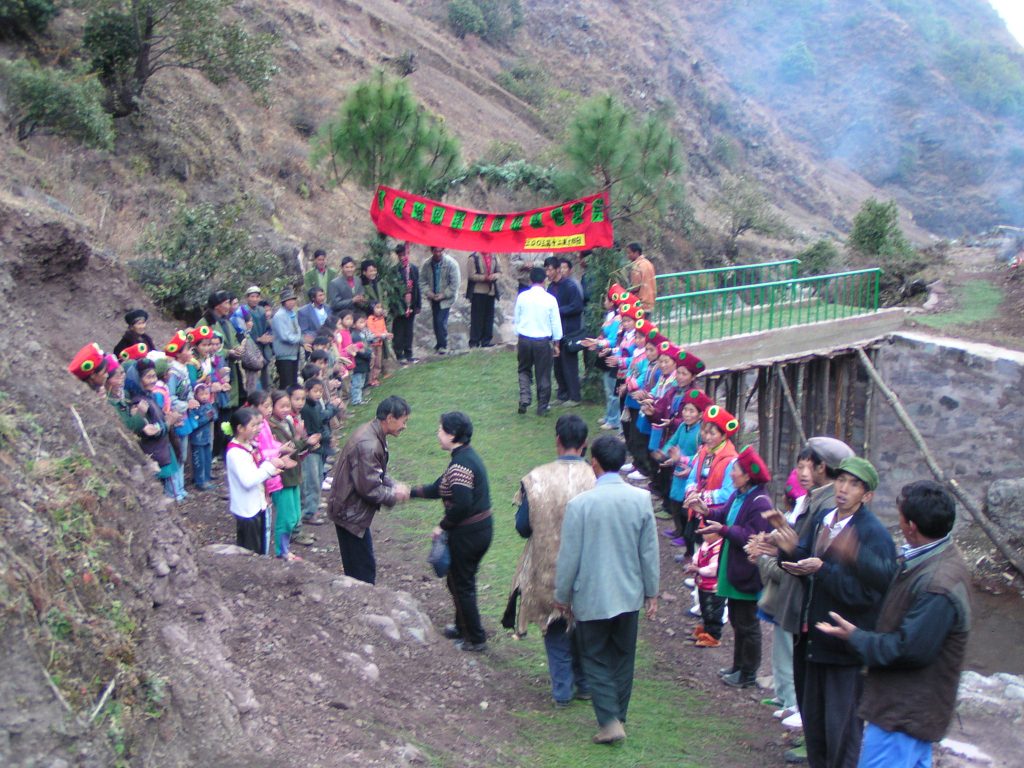
The Fongs became farmers as well and introduced new and improved varieties of corn, potatoes and the like to the villagers. They encouraged these villagers to share their improved crops and blessings with others. Louise and Loon Siong also concocted a tonic made from the pericarp or layers of skin from corn cobs, and demonstrated through simple experiments why this brew was good for their health.
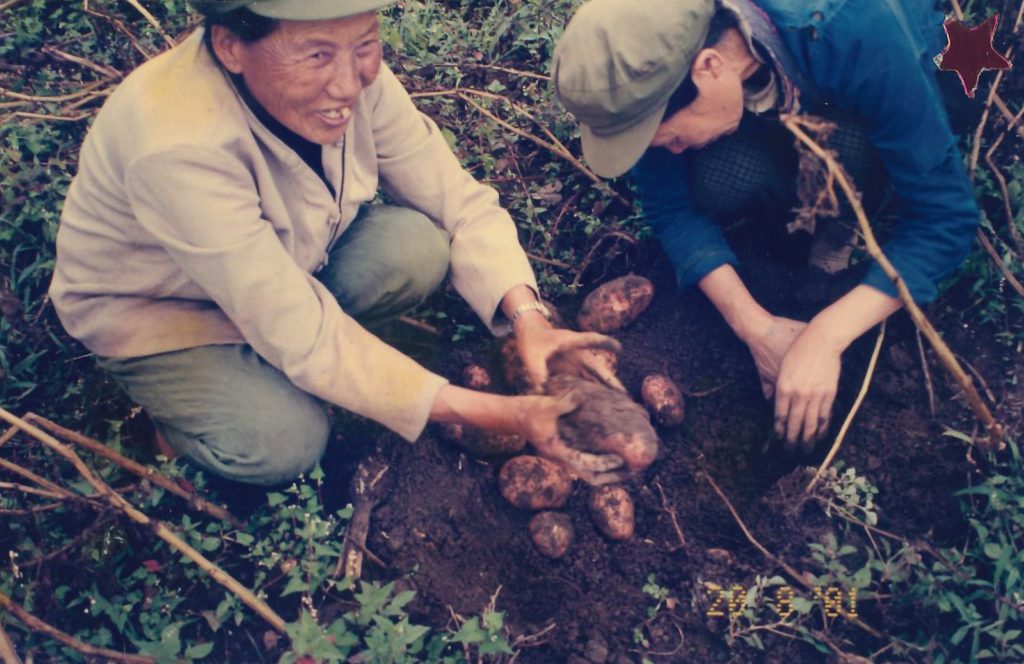
Louise also found opportunities to make God’s Word and Truth come alive in the agricultural setting. She said: “It was easy to draw lessons from the field. The villagers understood how even cows would avoid feeding on weeds which grew straight up, while healthy crops like wheat got choked. The lesson from the parable of the weeds in Matthew 13:24–30 was something that the villagers could relate to.”
There are many more stories of what the Fongs did to bless the Yi people. The people they served came to accept the Fongs as not mere observers and innovators, but as co-workers. Loon Siong aptly put it this way: “We said that we were there to help, and we showed that we meant it. Even though the work was hard and we were not young, we were happy to be a part of the project. I believe it was important for the Yi to have the correct impression of what it meant to be a child of God. It opened the way for them to listen when we shared what we knew with them because they could see that we sincerely wanted to improve their lives.”
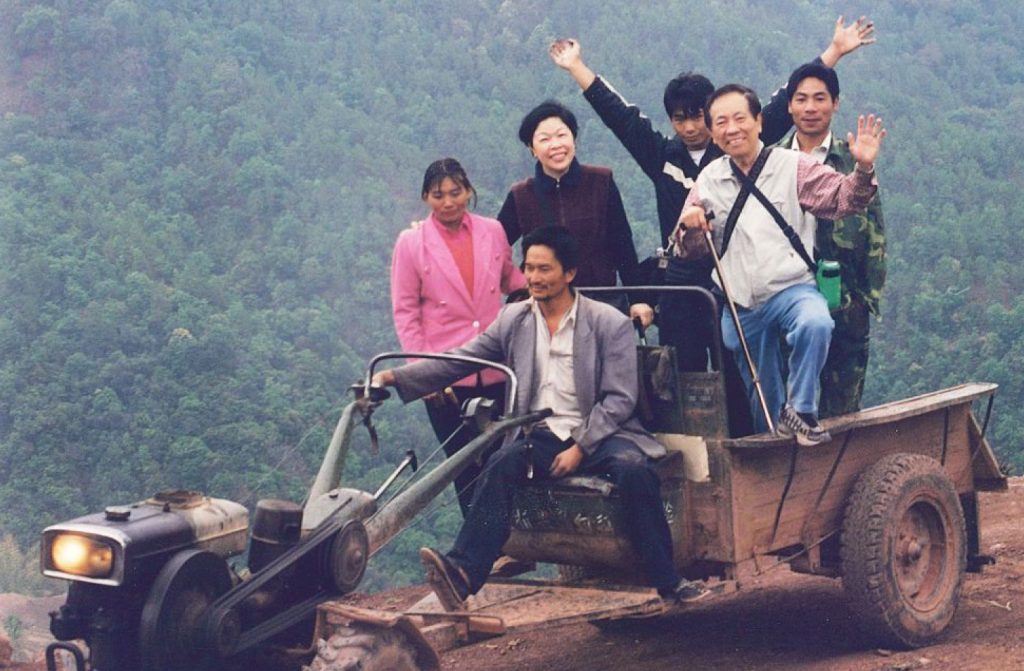
To God be all the glory!

